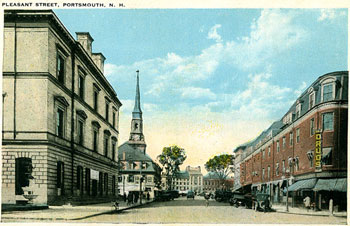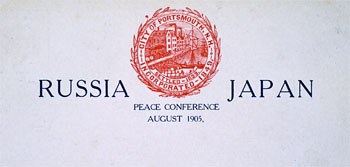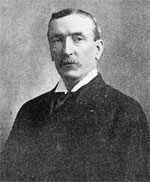
Place, Part Three: New York, Sagamore Hill, and Oyster Bay, continued . . .

The Pleasant Street view of Portsmouth has changed little in 100 years. Richard Candee collection. View larger image.
The ships stopped for the night at Newport, Rhode Island, where Witte, known to dislike sea voyages, left his ship and traveled by train to Boston where he met with officials at Harvard and with some Russian émigrés. In his memoirs, Witte recalled, "In the evening of the same day I reached Portsmouth which is a combination naval base and a small town, the latter being the summer residence of middle class people. At the hotel I found some of the members of my retinue, who had preferred to come to Portsmouth by rail instead of by sea. The warships, which carried the diplomatic missions, were due to arrive in Portsmouth the next morning (August 8). Our vessel was the first to arrive. Earlier in the morning I had stolen incognito into the naval port and, as soon as our warship entered the harbor, I made my way to her in a motor boat, boarded and later disembarked accompanied by Baron Rosen."

Portsmouth Athenaeum collection.
Why Portsmouth, New Hampshire
After Roosevelt convinced the combatants to negotiate a treaty, all that remained for the two countries was to agree on a conference location. After several foreign cities were considered and rejected, Russia suggested Washington and Japan agreed. As Washington was (and is) well known for its oppressive summer heat, Roosevelt interpreted the agreement on the American capital to mean that an East Coast site would be acceptable, assuming it had comfortable weather.

NH Governor John McLane. Harper's Weekly.
In the belief that a New Hampshire location would boost the tourist economy, the owners of the Mount Washington Hotel at Bretton Woods told Governor John McLane they would host the peace conference and assume all costs. The governor and executive council immediately issued an invitation and asked former senator William Chandler and congressmen to present it to Secretary of State John Hay. The secretary told Chandler that the invitation would have to be given directly to the Japanese and the Russians. Chandler and New Hampshire Secretary of State Pearson with congressman went to the two embassies, meeting with Japanese Minister Takahira and Russian Ambassador Cassini. A few days later, the state department notified then New Hampshire Senator Jacob Gallinger that Portsmouth would be the preferred location. The Portsmouth Navy Yard could provide the proper security for formal negotiations and Roosevelt, a former Assistant Secretary of the Navy, trusted the Navy to develop and carry out the necessary protocols required for the formal negotiations.
To secure suitable accommodations for the two delegations, Gov. McLane, along with Secretary Pearson and Councilor Towle, immediately went to Portsmouth to meet with Calvin Page, the trustee of the Frank Jones estate, which owned the Hotel Wentworth. Page quickly agreed to provide the necessary accommodations and to assume the financial responsibility for the envoys' stay.
With a transatlantic cable available at Rye Beach, the Portsmouth Navy Yard as a meeting site offering security and privacy, and the availability of the large Hotel Wentworth, Portsmouth became the perfect location.
